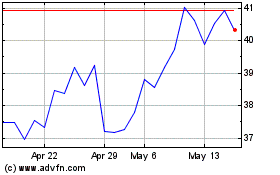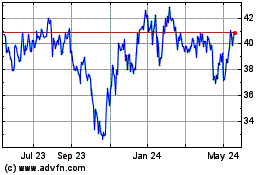By Paul Page
Sign up:With one click, get this newsletter delivered to your
inbox.
Wal-Mart Stores Inc. is betting big on distribution Mexico. The
retailer's Wal-Mart de Mexico SAB unit plans to invest $1.3 billion
to improve logistics in the country by extending its network of
distribution centers and upgrading existing warehouses, the WSJ's
Anthony Harrup reports. The commitment on top of annual spending
Wal-Mart already is undertaking in the country comes as many
companies are showing concern over investments in Mexico as the
incoming Donald Trump administration raises questions over the
future of U.S. cross-border trade. Mexico touts this week's
successful auction of oil exploration blocks as a sign of foreign
investment interest and of future economic growth. With 2,300
stores and 200,000 workers, Wal-Mart remains the country's biggest
retailer and private-sector employer, and the spending on logistics
suggests the election hasn't diminished the company's confidence in
the market.
The pending sale of the biggest container terminal at
California's Port of Long Beach may trigger more waves of change
across container shipping competition. Hyundai Merchant Marine Co.
and Mediterranean Shipping Co. are in pole position to buy a
majority stake in Total Terminals International LLC, the WSJ's
Costas Paris reports, in a joint bid that may bolster the Korean
operator's effort to join a shipping alliance. The stake comes from
Hanjin Shipping Co., which went bankrupt in August and now is being
sold off in pieces. MSC holds the other 46% of the Long Beach
terminal, and co-ownership of a critical gateway facility may give
Hyundai Merchant Marine more standing to work with the 2M Alliance
made up of MSC and Maersk Line. Shippers are balking at having a
Korean carrier included in 2M after the abrupt demise of Hanjin,
but the carriers are anxious for an operating agreement even if it
falls short of full alliance membership.
A bigger piece of the Apple Inc. supply chain may be moving to
the U.S. Foxconn Technology Group, a major producer of the iPhone
and other Apple products, says it is in talks to expand in the
U.S., the WSJ's Eva Dou and Tripp Mickle report, marking what could
be a big shift in electronics manufacturing as President-elect
Donald Trump pledges to revive American factories. A small share of
Apple products are already made in the U.S. by other contract
manufacturers, but the overwhelming majority of Apple products are
assembled in China, and most of them by Foxconn at factories in
China that employ hundreds of thousands of workers in its Chinese
factories. It isn't clear that any Foxconn expansion in the U.S.
would be to make Apple products, and shifting the assembly would
trigger big changes across the extensive distribution network that
pulls high-value components into Foxconn sites. The company,
formally known as Hon Hai Precision Industry Co., has been looking
at U.S. expansion for some time, however, noting that it would mean
making goods closer to the buyers of electronics.
SUPPLY CHAIN STRATEGIES
IKEA is rethinking its famously sprawling, remote stores to meet
big changes in distribution and the retail business. The iconic
Sweden-based furniture retailer is adapting to shifting trends by
creating smaller stores closer to population centers, a move that
means rebuilding its simple but highly efficient distribution
channels. IKEA Chief Executive Peter Agnefjäll tells the WSJ's
Saabira Chaudhuri the company expects to use more of its stores as
"click and collect" sites, allowing customers to order goods online
and pick them up at the sites. But bigger changes are moving
through its supply chains, with some distribution centers
refurbished to handle both shipping to stores and e-commerce
fulfillment and work underway to bypass stores entirely and ship
directly to customers. That means reconfiguring logistics
operations and a business strategy built on cheap land far from
city centers. New retail buying patterns suggest, however, that
IKEA has to get closer to its customers rather than waiting for
consumers to trek to IKEA.
The high-tech supply chain that Nokia Corp. built and then
dismantled in a corner of Finland may be rising again. Several
technology startups are heading to the provincial Finnish city of
Salo, the WSJ's Matthias Verbergt reports, lured by the expertise
and the infrastructure in the community known by some as Nokia
Town. Nokia left the town with a big gap when the pioneer of the
cellular phone abandoned manufacturing. But when San Diego-based
Nuviz Inc. recently hired 20 engineers and developed its high-tech
head-up displays for motorcyclists in less than six months in Salo,
it suggested the town's technology supply chain isn't completely
broken. More than dozen a companies have set up shop in former
Nokia premises, including cellphone maker Turing Robotics Inc.
Though still fledgling, the revival suggests how the ruins of a
large tech business can become fertile ground for startup
industries.
QUOTABLE
IN OTHER NEWS
The Supreme Court pressed lawyers for defunct New Jersey trucker
Jevic Transportation Inc. on why a settlement that left workers
unpaid didn't violate bankruptcy law's repayment rules. (WSJ)
Third-quarter volume of U.S. home construction loans grew at the
fastest rate in more than two years. (WSJ)
German manufacturing orders surged 4.9% from September to
October. (WSJ)
Mining giant Consol Energy Inc. gains more earnings from natural
gas than coal, highlighting the difficulty in delivering in
political promises to revive the coal industry. (WSJ)
Drone maker AeroVironment Inc. swung to a loss in its latest
quarter as sales in its unmanned-aircraft-systems business fell.
(WSJ)
Costco Wholesale Corp. expanded its fiscal first-quarter profit
as same-store sales grew for the first time in three quarters.
(WSJ)
Bankrupt retailer American Apparel LLC will close nine stores
this month, including sites in Washington, D.C., and New York
City.
Pebble Technology Corp. will close operations and stop selling
smartwatches as Fitbit Inc. buys its intellectual property and
hires key personnel. (WSJ)
Handbag retailer Vera Bradley Inc. lowered its full-year outlook
after same-store sales fell for the eighth straight quarter.
(WSJ)
Office products retailer Staples Inc. will sell its European
operations to private-equity firm Cerberus Capital Management L.P.
(WSJ)
Taiwan Semiconductor Manufacturing Co. will build a $15.7
billion plant in Taiwan to make the world's most advanced chips.
(Nikkei Asian Review)
Blue Bell Creameries will reopen the Tucson, Ariz., distribution
center it closed in 2015 after products tested positive for
Listeria. (Arizona Daily Star)
Rhode Island will install electronic tolls to charge heavy-duty
trucks traveling through the state. (WPRI)
Global air cargo traffic grew at the fastest pace in 18 months
in October following the collapse of Hanjin Shipping Co.
(Reuters)
Material-handling products maker Columbus McKinnon Inc. will
acquire Stahl Cranesystems, a unit of Konecranes PLC, for $240
million. (Industrial Distribution)
United Parcel Service Inc. is testing use of electric-powered
tricycles for delivery in Portland, Ore. (DC Velocity)
ABOUT US
Paul Page is deputy editor of WSJ Logistics Report. Follow him
at @PaulPage, and follow the entire WSJ Logistics Report team:
@brianjbaskin, @lorettachao, @smithjenBK and @EEPhillips_WSJ and
follow the WSJ Logistics Report on Twitter at @WSJLogistics.
Subscribe to this email newsletter by clicking here:
http://on.wsj.com/Logisticsnewsletter .
Write to Paul Page at paul.page@wsj.com
(END) Dow Jones Newswires
December 08, 2016 06:53 ET (11:53 GMT)
Copyright (c) 2016 Dow Jones & Company, Inc.
Wal Mart de Mexico SAB d... (QX) (USOTC:WMMVY)
Historical Stock Chart
From Nov 2024 to Dec 2024

Wal Mart de Mexico SAB d... (QX) (USOTC:WMMVY)
Historical Stock Chart
From Dec 2023 to Dec 2024


